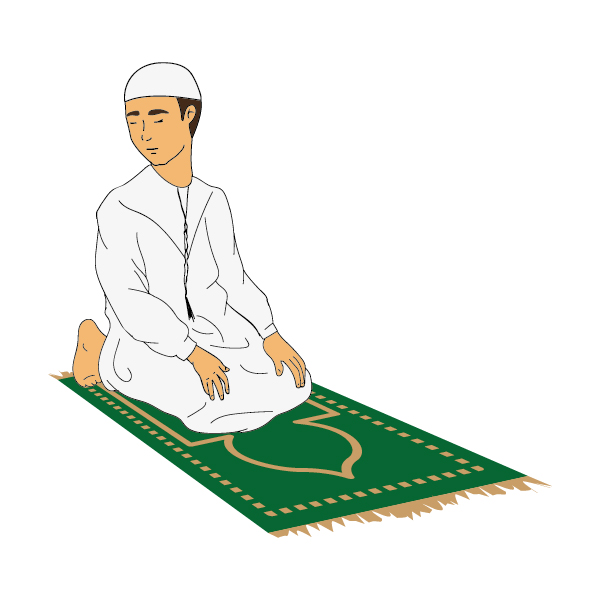This book represents the cultural image of tolerant, moderate, and humanitarian Islam through looking closely at Islamic basics for those whom Allah guided to the right path, the true religion. No wonder Al Farooq Omar Bin Al Khattab Mosque & Centre in Dubai has a monotheistic, intellectual, human, and cultural message. Therefore, this book is the output of the solidarity of good wills and intentions to convey the true message of Islam, and to explain the essentials every Muslim has to know and learn as an approach to understand the Shari`ah, doctrine, and etiquette of Islam.
Finally, we say to all whom Allah opened their hearts to Islam, the true religion, “O Allah, make our and their feet firm on Your religion and Shari`ah! O Lord, expand our chests, facilitate our affairs, and make us true guide, not misleaders nor of those who go astray. Amen!”
The pillars of Islam
Islam is built upon five pillars as the Prophet (peace be upon him) said in the Hadith reported by `Abdullah bin Omar, “Islam is built upon five [pillars]: testifying that there is none worthy of worship except Allah and that Muhammad is the Messenger of Allah, establishing the prayers, giving zakat, making pilgrimage to the House and fasting the month of Ramadan.” [Reported by Al Bukhari, Hadith No. 8, and Muslim No. 19 -16].
1. The Testimony of faith
It is the key which a Muslim uses to enter Islam. It (the testimony of faith) has two parts, the first is: “There is none worthy of worship except Allah”. To achieve this part, a Muslim has to utter it with his tongue, and believe with his heart in “there is no true god but Allah” upon Whom a Muslim depends. This testimony requires that Muslims have to believe in the oneness of Allah, the sole Creator of the universe without associating partners with him in worship.
The second part of testimony, “That Muhammad is the Messenger of Allah” which means that a person has to believe that Muhammad (peace be upon him) was sent as a mercy to mankind and was sent as a warner and a bearer of glad tidings for all people. This part requires that Muslims must follow the example of Muhammad through enjoining good and forbidding evil. Allah (Glory be to Him) says, “So take what the Messenger assigns to you, and deny yourselves that which he withholds from you.” [Surat Al-Hashr: Ayah 7].
2. Establishing the Prayers
Salah (Prayer) is the link between a Muslim and his Lord. It has a high status in Islam. It is the first matter a person shall be held accountable for on the Day of Judgement. If it is perfect, then the rest of his deeds will be perfect. However, if it is imperfect, the rest of his deeds will be imperfect; so it is the pillar of Islamic religion. There are only five daily obligatory Salah on a Muslim and the extra shall be voluntary. A Muslim must perform Salah at its earliest time and in the proper manner as described in Sunnah. The Prophet Muhammad (peace be upon him) said, “Pray as you have seen me praying.” [Reported by Al-Bukhari No. 605 on the authority of Malik ibn Al-Huwayrith].
3. Giving the Zakat
Zakat is a financial obligation that Allah prescribed on all Muslims who own Nisab (a minimum value when reached a Muslim must pay 2.5% of his properties), estimated by 85 grams of gold. It is a purification for their souls of stinginess, and for their Records of deeds of sins. Allah (Glory be to Allah) says, “Of their goods, take alms, that so thou mightiest purify and sanctify them.” [Surat At-Tawbah: 103].
The amount of zakat is 2.5% that is usually payable on assets continuously owned over one lunar year that are in excess of the nisab. Zakat is only paid to the poor and the needy, and this obligatory duty is overlooked when a Muslim who does not own the nisab. Islam left no choice for a Muslim to dispose zakat, but it specified eight channels to give away zakat and a Muslim should choose one of them.
Allah (Glory be to Him) says, “Alms are for the poor and the needy, and those employed to administer the (funds); for those whose hearts have been (recently) reconciled (to Truth); for those in bondage and in debt; in the cause of Allah; and for the wayfarer: (thus is it) ordained by Allah, and Allah is full of knowledge and wisdom.” [Surat At-Tawbah: 60].
4. Fasting during the Month of Ramadan
The meaning of fasting is to fast the Month of Ramadan. Ramadan is a great season abounds with good deeds, is a blessed month in which Allah’s mercy descends upon His Servants, and a believer renews his adherence with Allah and draws nearer to Him with acts of worship. Fasting Ramadan has several virtues, whoever fasts the month of Ramadan with true faith and hope for its reward shall have all of his previous sins forgiven. Muslims abstain from food, drink, sexual intercourse –for the married– from dawn to sunset. Fasting is not obligatory on those who are unable to fast such as the sick or those on journeys. Allah (Glory be to Him) says, “but if any of you is ill, or on a journey, the prescribed number (Should be made up) from days later.” [Surat Al-Baqarah: 184].
5. Hajj (Pilgrimage is a duty on those who can afford the journey)
The word “Hajj” means; linguistically “Direct the intention to a sacred thing”. Idiomatically, “visiting the Sacred House in Makkah, standing on `Arafat, performing Tawaf (Circumambulating the Ka`bah) around the Ka`bah. Hajj was made obligatory on every Muslim, adult , and physically and financially capable of bearing the difficulties of the journey. Allah (Glory be to Him) says, “Pilgrimage thereto is a duty men owe to Allah,- those who can afford the journey” Pilgrimage thereto is a duty men owe to Allah,- those who can afford the journey” [Surat Ali `Imran: 97]. Allah has ordained Hajj to purify souls, and teach it how to practice senses of sincerity, obedience, and patience. The Prophet (peace be upon him) said, “Whoever performs Hajj for the sake of Allah and does not commit any lewdness or sins returns like the day in which his mother gave birth to him [without any sins].” [Narrated by Al-Bukhari and Muslim on the authority of Abu Hurayrah, Hadith No. 438 – (1350)].
The pillars of faith
Faith linguistically means “Belief in the existence of something”, and idiomatically means "Knowledge that settled in the heart, certified by the tongue and actions." The pillars of faith are six according to the authentic Hadith recorded in Al-Bukhari on the authority of Omar bin Al Khattab (May Allah be pleased with him), when angel Gabriel said to the Prophet, “Tell me about faith. He [the Messenger of Allah (peace be upon him)] responded, ‘It is to believe in Allah, His angles, His books, His messengers, the Last Day and to believe in the divine decree, [both] the good and the evil thereof.’”
The six Pillars of Faith:
-
Belief in Allah the Almighty: It is to believe surely and confidently in the existence of Allah the Almighty as our Lord, God, One, has no partners, and believe in all the names and attributes of Allah as mentioned in the Qur’an and authentic Hadith. We must believe that they are unique to Him, without negating them, stripping them of any meaning, or distorting their meaning by interpreting them figuratively. Such a belief is obtained by contemplation in this entire universe and in ourselves.
-
Belief in Angels: It is to believe surely and confidently that Allah (Glory be to Him) created Angels from light. They are extraordinary creatures who flinch not (from executing) the commands they receive from Allah, but do (precisely) what they are told. Allah the Almighty says, “It is not righteousness that ye turn your faces Towards east or West; but it is righteousness- to believe in Allah and the Last Day, and the Angels, and the Book, and the Messengers; to spend of your substance, out of love for Him, for your kin, for orphans, for the needy, for the wayfarer, for those who ask, and for the ransom of slaves; to be steadfast in prayer, and practice regular charity; to fulfil the contracts which ye have made; and to be firm and patient, in pain (or suffering) and adversity, and throughout all periods of panic. Such are the people of truth, the Allah-fearing.” [Surat Al-Baqarah: 177]. This is a proof and evidence that the Angels are existent and we have to believe in them.
-
Belief in the Devine Books: It is to believe in the existence of the Divine Scriptures and believe in all of them provided that they do not contain any deviation or distortion. Among these Books which Allah sent down to His Prophets and Messengers are the Holy Qur’an, the Bible (Injeel), the Torah (Torah), and Psalms (Zaboor). Some of those divine books were not mentioned. Allah says in His Holy Book (Qur’an), “And this is in the Books of the earliest (Revelation), The Books of Abraham and Moses.” [Surat Al A`la: 18-19]. This is an evidence that some of those divine books were not mentioned.
-
Belief in all Prophets and Messangers of Allah: It is to believe in all Prophets and Messengers of Allah who are mentioned in the Glorious Book (Qur’an) and to trust them all and we must not disbelieve in them. There are 25 prophets mentioned in Glorious Qur’an. These Prophets are: Adam, Noah, Enoch, Saleh, Abraham, Hud, Lut, Jonah, Ishmael, Isaac, Jacob, Joseph, Job, Jethro, Moses, Aaron, Elisha, Ezekiel, David, Zacharia, Solomon, Elijah, John (the Baptist), Jesus, Muhammad (peace be upon them all). Muhammad (peace be upon him) is the last and final Prophet and there will be none after he. A Muslim has to believe in all Prophets and Messengers of Allah, whether they are mentioned in the Glorious Qur’an or not, and believe in their messages and prophethood. Belief in all Prophets and Messengers is the fourth pillar of faith.
-
Belief in the Last Day: It is to believe in all what Allah and His Messenger have told us about after death such as the trial and torture of the grave, gathering, resurrection, bliss in the grave, the scale of deeds, the reckoning, the basin, the As-Sirat (Straight Way), the Intercession of the Messenger, Paradise, Hell, and all what happen after one’s death.
-
Belief in the divine decree, [both] the good and the evil thereof: It is to believe that all deeds [both] good and the evil thereof happen according to Allah’s decree and will. Righteous deeds take place according to Allah’s decree and will, and bad deeds also take place according to Allah’s decree and will but not according to His pleasure. The Glorious Qur’an and Sunnah confirmed, as Allah says, “Verily, all things have We created in proportion and measure.” This is a proof and evidence for people that every thing in the world happens according to Allah’s decree and will. Belief in that is one of the conditions of Muslim’s faith.
Memorisation of selected Qur’anic Surahs
-
Al-Fatihah
بِسْمِ اللَّهِ الرَّحْمَنِ الرَّحِيمِ (1) الْحَمْدُ لِلَّهِ رَبِّ الْعَالَمِينَ (2) الرَّحْمَنِ الرَّحِيمِ (3) مَالِكِ يَوْمِ الدِّينِ (4) إِيَّاكَ نَعْبُدُ وَإِيَّاكَ نَسْتَعِينُ (5) اهْدِنَا الصِّرَاطَ الْمُسْتَقِيمَ (6) صِرَاطَ الَّذِينَ أَنْعَمْتَ عَلَيْهِمْ غَيْرِ الْمَغْضُوبِ عَلَيْهِمْ وَلَا الضَّالِّينَ (7)
In the name of Allah , the Entirely Merciful, the Especially Merciful (1) [All] praise is [due] to Allah , Lord of the worlds (2) The Entirely Merciful, the Especially Merciful (3) Sovereign of the Day of Recompense (4) It is You we worship and You we ask for help (5) Guide us to the straight path (6) The path of those upon whom You have bestowed favor, not of those who have evoked [Your] anger or of those who are astray (7)
-
Al-Kawthar
إِنَّا أَعْطَيْنَاكَ الْكَوْثَرَ (1) فَصَلِّ لِرَبِّكَ وَانْحَرْ (2) إِنَّ شَانِئَكَ هُوَ الْأَبْتَرُ (3)
Indeed, We have granted you, [O Muhammad], al-Kawthar (1) So pray to your Lord and sacrifice [to Him alone] (2) Indeed, your enemy is the one cut off (3)
-
Al-Ikhlas
قُلْ هُوَ اللَّهُ أَحَدٌ (1) اللَّهُ الصَّمَدُ (2) لَمْ يَلِدْ وَلَمْ يُولَدْ (3) وَلَمْ يَكُنْ لَهُ كُفُوًا أَحَدٌ(4)
Say, "He is Allah , [who is] One (1) Allah , the Eternal Refuge (2) He neither begets nor is born (3) Nor is there to Him any equivalent" (4)
The Rules of Ablution and Purity
-
Intention and washing hands to the wrists: Intention of performing ablution, reciting “Bismillah (In the Name of Allah), and washing both hands to the wrists 3 times.

-
Mouth gargling: Gargling the mouth 3 times. Putting water in mouth and spitting it.

-
Sniffing water and blowing it out: Sniffing water and blowing it out 3 times.

-
Washing one’s face: Washing the whole face 3 times. The limit of washing the face is from the forehead to the chin and from ear to ear.

-
Washing one’s arms: Washing arms up to the elbow 3 times starting with the right one.

-
Wiping the head with wet hands: Wiping the head back and forth.

-
Wiping both ears: Wipe both ears at once with wet fingers after wiping the head.

-
Washing Both Feet: Wash both feet up to the ankles 3 times, passing wet fingers between toes.

Upon Completing the ablution, you should say, “Ashhadu Alla Ilaha Illa Allah, Wahdahu La Sharika Lah, wa’anna Muhammadan `Abdahu warasulah. Allahumma Ij`alni minat-Tawabin waj`alny minal-Mutatahirin. [i.e., I bear witness that none has the right to be worshipped but Allah alone, Who has no partner; and I bear witness that Muhammad is His servant and Messenger. O Allah, make me among those who turn to You in repentance, and make me among those who are purified].”
How to Pray
-
The Opening Takbir: I stand facing the Qibla (Ka`bah) with the intention of offering Salah (in my heart not uttering it with tongue) because intention is in the heart, then I lift my hands next to my ears saying, “Allahu Akbar", meaning Allah is the Greatest.
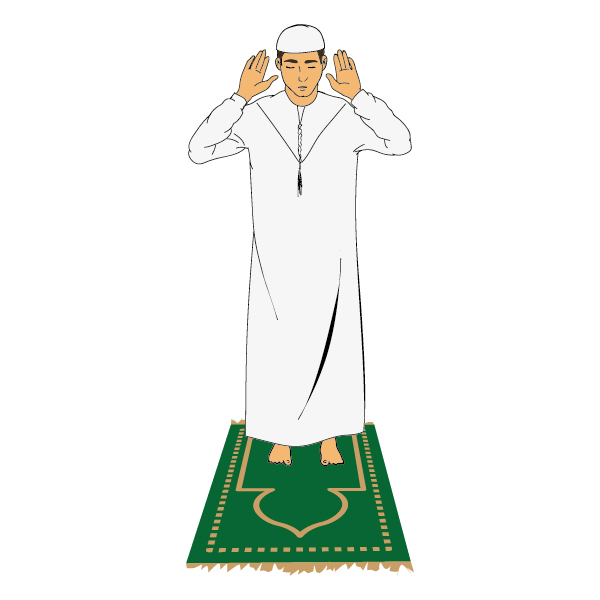
-
I place my right hand on the left below the chest then recite Surat Al-Fatihah then any other portion of the Qur’an.
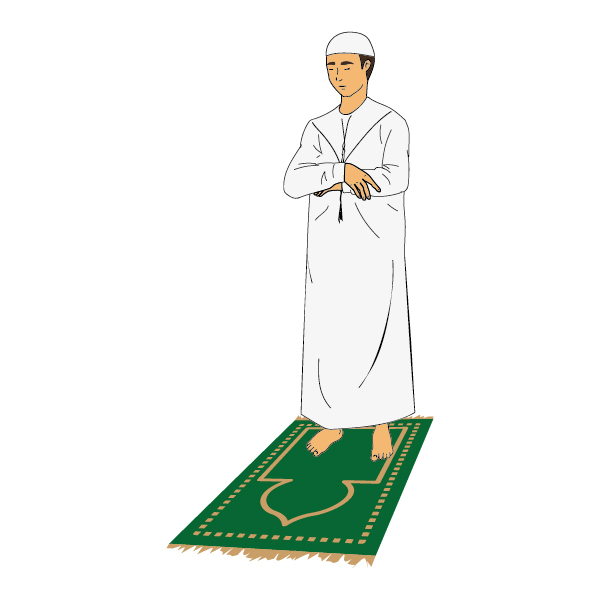
-
Bowing: I bow with my back straight then I say, “subhana Rabbiya Al-`Azhim [i.e., Glorified be Allah, the Most Magnificent]."
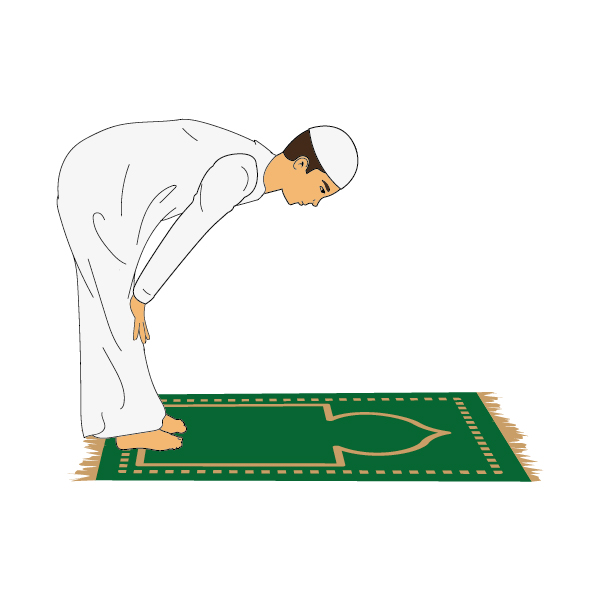
-
I stand straight after bowing saying, “Sami`a Allahu li-man hamidah, meaning "Allah listens and responds to those who praise Him."
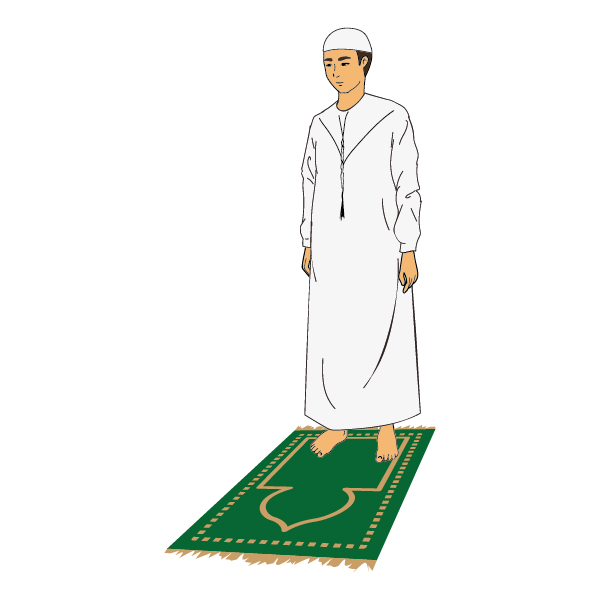
-
Prostration: I prostrate myself, resting my forehead, nose, two hands, my knees, and my toes on the ground saying, “subhana Rabbiya Al-A`la meaning "Glorified be He, the Most High"
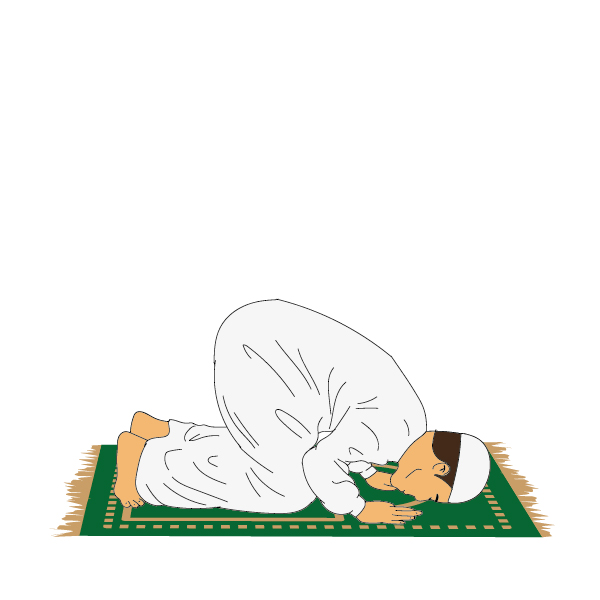
-
Sitting between the 2 Prostrations: I sit saying , "Allahu Akbar", placing my hands on my knees saying, “Rabbi-ighfir le, irhamni, U`fu `Anni” meaning "O my Lord, forgive me! Have mercy on me! And forgive me!
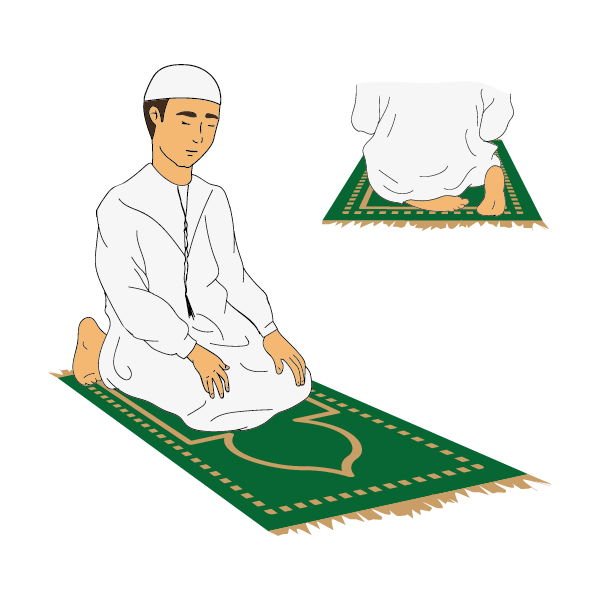
-
Tashahhud: “At-tahiyyatu lillahi wa 's-salawatu wa 't-tayyibatu. As-salamu `alayka ayyuha'n-nabiyyu wa rahmatullahi wa barakatuh. As-salamu `alayna wa `ala `ibadillahi's-saliheen. Ashadu alla ilaha illa Allah wa ashhadu anna Muhammadan `abduhu wa rasuluh. Allahumma salli `ala Muhammadin wa `ala ali Muhammadin kama sallaita `ala Ibrahima wa `ala ali Ibrahima Innaka hameedun Majid Allahumma barik `ala Muhammadin wa `ala ali Muhammadin kama barakta `ala Ibrahima wa `ala ali Ibrahima Innaka hamidun Majid.” Meaning “(All the salutations, prayers and good things are for Allah. Peace be on you O Prophet, and the blessings of Allah, and His grace and blessings. Peace on us and on all the righteous servants of Allah. I bear witness that none but Allah is worthy of worship and bear witness that Muhammad is the Servant and Messenger of Allah.)
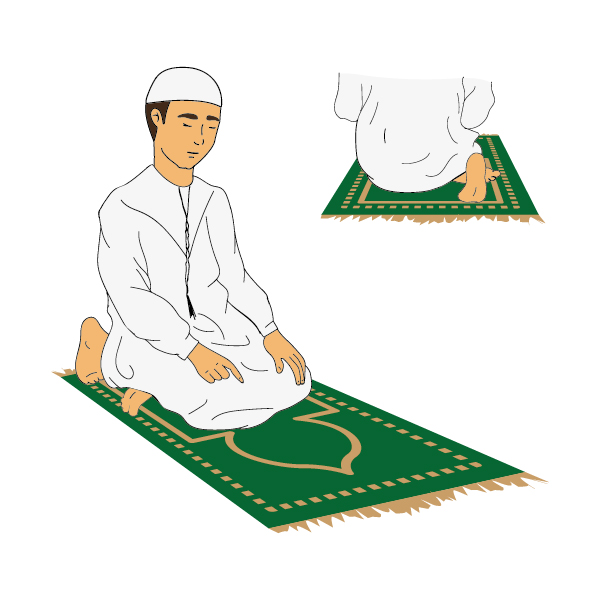
(O Allah, send grace and honour on Muhammad and on the family and true followers of Muhammad, just as you sent Grace and Honour on Ibrahim and on the family and true followers of Ibrahim. Surely, you are praiseworthy, the Great. O Allah, bless Muhammad and the family and true followers of Muhammad, just as you blessed Ibrahim and the family and true followers of Ibrahim. Surely, you are praiseworthy, the Great.)”
-
Performing Taslim: "As-Salaamu 'alaykum wa rahmatullaah," meaning "May Allah grant you peace and security, and may His Mercy be upon you"
